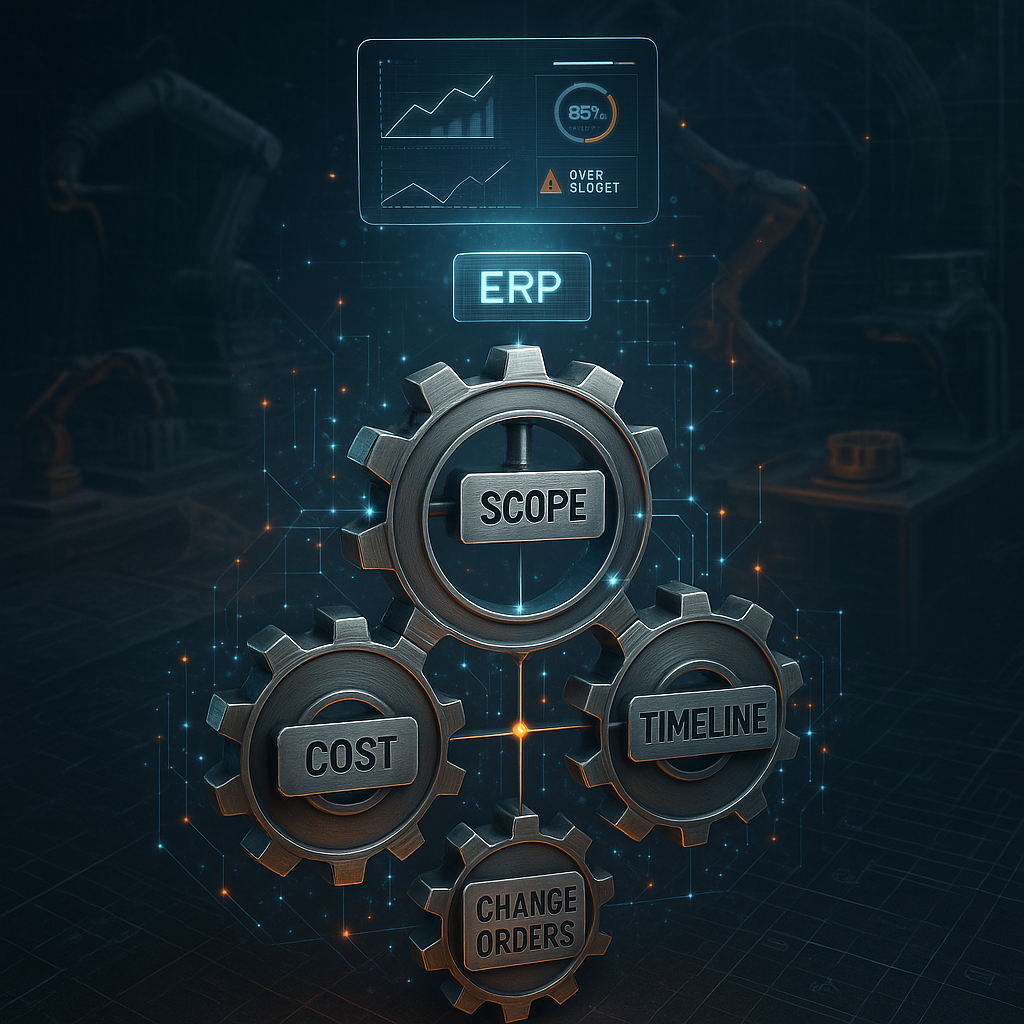Top Cloud-Based ERP Systems for Manufacturing: Best Vendors Compared
If you run a manufacturing operation, you already know the risks: missed ship dates, broken processes, and bloated inventories. In 2026, the...
5 min read
 Blake Snider
:
Aug 13, 2025 2:17:42 PM
Blake Snider
:
Aug 13, 2025 2:17:42 PM
Which ERP features should a manufacturing business prioritize to run on time and on budget?
A manufacturer’s ERP system directly affects how well the business runs. Manufacturers turn to ERP when there are real problems to solve: missed delivery windows, inventory mismatches, incomplete reports, or unexpected job costs. The right features can fix those pain points, but only if they align with how the business actually works.
ERP software connects departments, automates workflows, and keeps data consistent across every stage of production. A strong implementation makes that possible. In fact, StackPlan reported an 85% success rate among manufacturers that partnered with ERP consultants.
The sections that follow map the ERP features for manufacturers, organized by how they help you control materials, costs, timelines, and product quality.
Finance modules handle accounting, cash flow, taxes, and multi-entity reporting. Accurate financial data supports forecasting, budgeting, and compliance. Sales tools manage quoting, order processing, and invoicing. When synced with production, they improve delivery accuracy and customer service. Inventory management tracks raw materials, finished goods, and work-in-progress across all locations. Real-time visibility prevents overstock, reduces waste, and keeps production running.
ERP systems simplify purchasing and supplier coordination. Built-in tools manage vendor data, automate purchase orders, and track deliveries. When integrated with quality control, they help catch problems early. Supply chain features connect inbound shipments, inventory, and production schedules. With clear data, manufacturers adjust to delays, lead time changes, or material shortages without disruption.
Cost visibility is critical for every manufacturing business. ERP job costing features allocate labor, materials, and overhead to specific orders or jobs. Teams get real-time cost tracking, accurate pricing, and better margin control, especially for make-to-order or project-based manufacturing.
Every manufacturing ERP system should support detailed bill of materials functionality. Accurate BOMs keep the manufacturing process consistent by defining exact materials, quantities, and build sequences. A modern ERP solution tracks multiple BOM versions, supports phantom items, and connects directly with CAD tools through PDM integrations.
Shop floor control tools are critical in any effective ERP system for manufacturers. MES modules track labor hours, machine utilization, work-in-progress, and production progress in real time. Real-time insight enables supervisors to make fast decisions and minimize downtime. The right ERP system connects shop floor data with scheduling and inventory, ensuring smooth handoffs and fewer disruptions.
The manufacturing industry needs ERP systems that can create flexible production plans. Planning and scheduling tools consider machine availability, material supply, and workforce capacity to build realistic timelines. When integrated with demand forecasting and inventory, ERP software allows manufacturers to reduce changeover time, minimize idle labor, and meet delivery targets without excess stock. Modern ERP systems such as IFS Cloud and Epicor ERP link MRP and capacity planning to live shop data, which reduces scheduling surprises.
New ERP systems must include quality control tools that support audits, certifications, and real-time inspections. Built-in quality features log defects, manage corrective actions, and capture test data tied to individual lots. For manufacturers in regulated industries, ERP systems offer the compliance framework needed to maintain certifications and avoid costly rework.
Traceability is one of the most important ERP features every manufacturer should consider. Whether you run process manufacturing, discrete production, or food and beverage, tracking raw material and finished goods through every stage supports compliance, fast recalls, and supplier accountability. ERP systems can track serial numbers, lot codes, and production events to create a full chain of custody across suppliers, production, and distribution. With that record in place, a manufacturing ERP solution speeds investigations, protects customers, and provides the documentation regulators expect.
Routing control, alternate BOMs, and engineering change management keep builds accurate. Job costing ties labor, materials, and overhead to each order, so teams see margin in real time. Finite capacity scheduling aligns machines and labor with due dates, which cuts expediting and late shipments. When the ERP system captures serial numbers and warranty data at shipment, service and returns get faster and cheaper. Shop floor data collection feeds real-time WIP to planning and inventory, which supports tighter supply chain management.
Formulation tools manage recipes, versions, and yields with multiple units of measure. Lot genealogy links raw material intake to every batch and finished item. Quality control gates each stage with specifications and certificates of analysis. Tank scheduling and batch sizing reduce waste and keep to regulatory limits. Analytics and business intelligence highlight variance trends, so teams improve throughput without risking compliance.
Allergen management, lot traceability, and recall workflows protect the brand and satisfy audits. Shelf life controls track aging, first‑expire‑first‑out rules, and temperature notes across warehouses and 3PLs. Catch‑weight handling and pricing tiers support contracts and promotions without manual work. Supplier scorecards, EDI with retail partners, and cloud‑based ERP portals improve supply chain visibility from ingredient source to store delivery.
Role-based dashboards pull live data from finance, inventory, production, and sales. Teams monitor order status, work-in-progress, scrap, and cash in one place. Self-serve reporting lets planners and managers build views without waiting on IT. Built-in business intelligence turns business data into clear visuals and alerts, and cloud-based ERP keeps those insights available on the floor and at supplier docks.
Alerts highlight exceptions, such as overdue purchase orders, rising machine downtime, or lots failing quality control, so leaders act before delays reach customers. An effective ERP system can integrate with MES and WMS, which means dashboards reflect the current state of production and the warehouse, not yesterday’s numbers. Smart manufacturing efforts benefit when enterprise resource planning provides a single source of truth.
Forecasting in a manufacturing ERP system uses sales history, seasonality, and customer commitments to project demand. MRP and capacity planning convert those signals into schedules, labor plans, and timed purchases of raw material. Planners can test scenarios, compare plans, and pick the load that meets service targets with the least excess inventory.
Predictive signals from analytics and business intelligence call out trends like longer changeovers, slower cycle counts, or repeat quality issues. Early warnings help manufacturers adjust supplier orders, rebalance lines, and avoid expediting. With supply chain management tied into planning, the operation runs steadier, and on-time delivery improves. ERP systems facilitate seamless hand-offs between purchasing, production, and finance when data flows in real time.
Manufacturing ERP delivers results when features match the way your plant runs. Prioritize tools that remove bottlenecks: accurate BOMs, connected scheduling, shop floor visibility, quality control, and full traceability. Clear reporting and practical forecasts keep plans realistic and orders on time. The benefits of ERP show up when enterprise resource planning supports the business process end-to-end.
Start with written business needs, map them to core ERP capabilities, and score each ERP vendor against use cases from your lines. Run a pilot, confirm integrations with MES and WMS, and plan training so adoption sticks. Implementing a manufacturing ERP system is most effective when done in phases and with clear ownership of data quality. The selection process should confirm fit with existing systems and future plans for business growth.
For platform comparisons and selection tips, read our guide on Top ERP Systems for Manufacturing to find the best ERP system for manufacturing. When you are ready to see features in action, request a feature walkthrough or white paper. The goal is to find the right manufacturing ERP software for your operation, not the longest feature list.
Astra Canyon designs and delivers IFS ERP for the manufacturing sector. The team boasts over 20 years of business experience, comprising more than 80 IFS consultants and over 80 IFS certifications, with a record of 250+ ERP implementations across discrete and process manufacturing, as well as distribution.
Manufacturing companies such as Kodiak, PowerSecure, Barnhart, ESG, and HCR rely on our experts to modernize enterprise resource planning, strengthen supply chain management, and raise shop floor performance. See this in practice with Nomad Global Communication Solutions, where IFS Cloud replaced legacy tools, enabled DoD compliance, and unified manufacturing and field service in one system. Read the full case study or watch what our customers say.
Want to explore IFS ERP features for your operation? Schedule a custom IFS ERP demo here.

If you run a manufacturing operation, you already know the risks: missed ship dates, broken processes, and bloated inventories. In 2026, the...

Project-based manufacturing runs on control, including scope, cost, and delivery. Without the right ERP, that control breaks down fast. Is your team...

7 min read
Your next Enterprise Resource Planning (ERP) system will either unlock your factory or cement your bottlenecks. You've likely outgrown your...